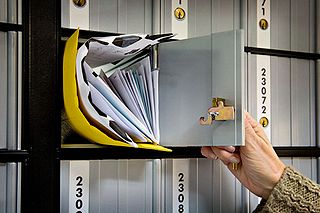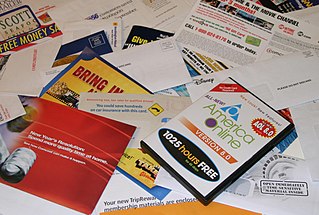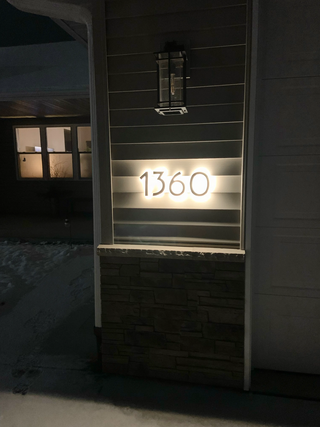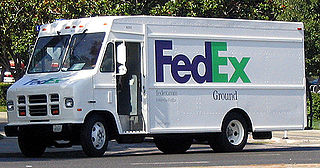
The United States Postal Service (USPS), also known as the Post Office, U.S. Mail, or Postal Service, is an independent agency of the executive branch of the United States federal government responsible for providing postal service in the United States, its insular areas, and its associated states. It is one of the few government agencies explicitly authorized by the Constitution of the United States. As of 2023, the USPS has 525,469 career employees and 114,623 non-career employees.

A ZIP Code is a system of postal codes used by the United States Postal Service (USPS). The term ZIP was chosen to suggest that the mail travels more efficiently and quickly when senders use the code in the postal address.

Dead letter mail or undeliverable mail is mail that cannot be delivered to the addressee or returned to the sender. This is usually due to lack of compliance with postal regulations, an incomplete address and return address, or the inability to forward the mail when both correspondents move before the letter can be delivered. Largely based on the British model that emerged in the late eighteenth century, many countries developed similar systems for processing undeliverable mail.

Yahoo! Mail is an email service offered by the American company Yahoo, Inc. The service is free for personal use, with an optional monthly fee for additional features. Business email was previously available with the Yahoo! Small Business brand, before it transitioned to Verizon Small Business Essentials in early 2022. Launched on October 8, 1997, as of January 2020, Yahoo! Mail has 225 million users.
In a postal system, a delivery point is a single mailbox or other place at which mail is delivered. It differs from a street address, in that each address may have several delivery points, such as an apartment, office department, or other room. Such buildings are often called multiple-dwelling units (MDUs) by the USPS.

A post office box is a uniquely addressable lockable box located on the premises of a post office.

Advertising mail, also known as direct mail, junk mail, mailshot or admail, letterbox drop or letterboxing (Australia), is the delivery of advertising material to recipients of postal mail. The delivery of advertising mail forms a large and growing service for many postal services, and direct-mail marketing forms a significant portion of the direct marketing industry. Some organizations attempt to help people opt out of receiving advertising mail, in many cases motivated by a concern over its negative environmental impact.

An address is a collection of information, presented in a mostly fixed format, used to give the location of a building, apartment, or other structure or a plot of land, generally using political boundaries and street names as references, along with other identifiers such as house or apartment numbers and organization name. Some addresses also contain special codes, such as a postal code, to make identification easier and aid in the routing of mail.
Within the United States, a commercial mail receiving agency (CMRA) is a private business that accepts mail from the Postal Service on behalf of third parties. A CMRA may also be colloquially known as a mail drop. A mailbox at a CMRA is called a private mailbox (PMB).
The Coding Accuracy Support System (CASS) enables the United States Postal Service (USPS) to evaluate the accuracy of software that corrects and matches street addresses. CASS certification is offered to all mailers, service bureaus, and software vendors that would like the USPS to evaluate the quality of their address-matching software and improve the accuracy of their ZIP+4, carrier route, and five-digit coding.

Freepost is a postal service provided by various postal administrations, whereby a person sends mail without affixing postage, and the recipient pays the postage when collecting the mail. Freepost differs from self-addressed stamped envelopes, courtesy reply mail, and metered reply mail in that the recipient of the freepost pays only for those items that are actually received, rather than for all that are distributed. Freepost of preprinted cards issued by businesses is also different from postal stationery sold by postal administrations.
Post offices and other mail service providers typically offer a mail forwarding service, commonly known as hybrid mail or virtual post office box services, to redirect mail addressed to one location to another address – usually for a given period. In the case of the United States Postal Service's First Class Mail, it is generally for a period of one year. British Royal Mail provides a service called Mail Redirection, enabling redirection for up to two years. Customers of such a service usually, but not exclusively, use mail forwarding when they change an address.
A Digital Postmark (DPM) is a technology that applies a trusted time stamp issued by a postal operator to an electronic document, validates electronic signatures, and stores and archives all non-repudiation data needed to support a potential court challenge. It guarantees the certainty of date and time of the postmarking. This global standard was renamed the Electronic Postal Certification Mark (EPCM) in 2007 shortly after a new iteration of the technology was developed by Microsoft and Poste Italiane. The key addition to the traditional postmarking technology was integrity of the electronically postmarked item, meaning any kind of falsification and tampering will be easily and definitely detected.
A Nixie is a name given by the United States Postal Service to a piece of mail which is undeliverable as addressed. It is derived from "nix", English slang for the German nichts ("nothing"), and "-ie", an item or a thing.

Surface mail, also known as sea mail, is mail that is transported by land and sea, rather than by air, as in airmail. Surface mail is significantly less expensive but slower than airmail, and thus is preferred for large or heavy, non-urgent items and is primarily used for sending packages, not letters.
Postal address verification is the process used to check the validity and deliverability of a physical mailing address. According to the United States Postal Service, an address is valid if it is CASS-certified, meaning that it exists within the comprehensive list of mailable addresses in their Address Management System. This is different from the credit card Address Verification System (AVS), which is the method used by credit card processors to authenticate ownership of a credit card by verifying that the account on the credit card matches the billing address on file. Credit card AVS does not determine deliverability of an address.

Tritek Technologies, Inc. was founded in 1984 by inventor and innovator James Malatesta. Headquartered in Wilmington, Delaware, USA. It specializes in custom designed hardware and software for mail processing equipment, imaging, and vote-by-mail. It has many patents in mail sorting and processing.
Semaphore Corporation was a company notable for being the first to provide public access to selected U.S. Postal Service databases, and for its early computer publications in the 1980s.
The 2020 United States Postal Service crisis was a series of events that caused backlogs and delays in the delivery of mail by the United States Postal Service (USPS). The crisis stems primarily from changes implemented by Postmaster General Louis DeJoy shortly after taking office in June 2020. The delays have had substantial legal, political, economic, and health repercussions.









